定名从句
高中名词性从句详细讲解+例句

名词性从句I. !"#$%&一、定义名词性从句是在句子中起名词作用的句子。
它在复合句中能担任主语、宾语、表语、同位语,分别称为主语从句、宾语从句、表语从句和同位语从句。
二、分类&表语从句1) That is(系动词) a book.S + P 表语2) The fact is(系动词)that he has lied to usS + P 表语从句&宾语从句1) He said(vt) nothing at the meeting.S + P 宾语2) He said (vt) (that) he would help us without hesitation.S + P 宾语从句3) He is interested in (prep) what we want for breakfast.S + P 宾语从句&主语从句1) His mistakes made his teacher angry.主语+ P2) That he made so many mistakes made his teacher angry.主语从句P3)What he said made his teacher angry.主语从句P&同位语从句1) You can turn to my friend Tom for help.S + P 同位语2) The announcement that a new airport was to be built nearby made us excited.S 同位语从句+ P3) We heard the news that the war had broken out between America and Iraq.S + P 同位语从句三、引导词名称引导词在从句中担任成分连接词that, whether, if 不作成分连接代词what, whatever, who, whoever, whose, which, whichever 主语、宾语、表语、定语连接副词when, where, why, how, whenever, wherever, however 状语例如:a. He said that he would come.b. Whether he can pass the exam is not certain.c. He agrees with what I said.d. He agrees with what was said.e. I don’t know what present I should buy.f. That is where Tom used to live.g. That’s why he left.四、名词性从句语序名词性从句用陈述句语序。
英语三大从句
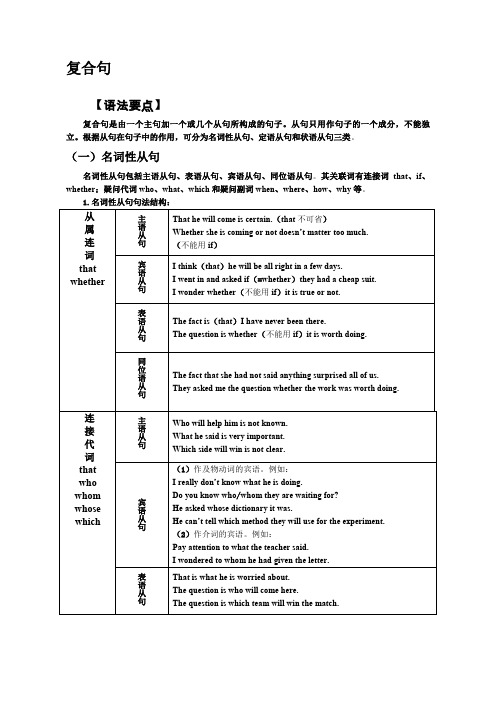
复合句【语法要点】复合句是由一个主句加一个或几个从句所构成的句子。
从句只用作句子的一个成分,不能独立。
根据从句在句子中的作用,可分为名词性从句、定语从句和状语从句三类。
(一)名词性从句名词性从句包括主语从句、表语从句、宾语从句、同位语从句。
其关联词有连接词that、if、whether;疑问代词who、what、which和疑问副词when、where、how、why等。
1.名词性从句句法结构:从属连词that whether 主语从句That he will come is certain.(that不可省)Whether she is coming or not doesn’t matter too much.(不能用if)宾语从句I think(that)he will be all right in a few days.I went in and asked if(=whether)they had a cheap suit.I wonder whether(不能用if)it is true or not.表语从句The fact is(that)I have never been there.The question is whether(不能用if)it is worth doing.同位语从句The fact that she had not said anything surprised all of us.They asked me the question whether the work was worth doing.连接代词that who whom whose which 主语从句Who will help him is not known.What he said is very important.Which side will win is not clear.宾语从句(1)作及物动词的宾语。
(完整版)定语从句语法详解

定语从句语法专题(Attributive Clauses)教案一. 定语从句的概述:1.定语从句:在复合句中,修饰某一名词或代词的从句叫定语从句。
在句中做定语,被修饰的名词或代词,叫做先行词。
从句通常放在先行词之后,由关系词(关系代词或关系副词)引导。
其作用是作定语修饰主句的某个名词性成分,相当于形容词,所以又称为形容词性从句,一般紧跟在它所修饰的先行词后面。
eg She is the girl(who got the first prize.)girl先行词who充当从句主语, 从句做定语修饰girlThis is the boy who broke the window.这就是打破窗子的孩子。
the boy是先行词, who broke the window是限制性定语从句, 明确指出theboy是打破窗子的那个孩子,who 在从句中充当主语That is the house where he lived ten years ago.He is the man who/that lives next door.He is the man who I want to see.先行词关系词定语从句复合句: 是由一个主句和一个或一个以上的从句构成的句子, 复合句中的主句和从句都具有完整的的主语和谓语, 主句是复合句的主体, 可以独立存在, 从句需要有一个连词引导, 是修饰说明主句的, 不能独立存在, 根据在句中的不同作用, 从句可以分为三类: 定语从句, 名词性从句, 状语从句。
二. 引导定语从句的关系词有两大类:1.关系词:引导定语从句的关联词称为关系词,关系词有关系代词和关系副词。
关系代词: that, who, whom, whose, which, as(主, 宾, 定)关系副词: when, where, why.(状语)2.关系词的作用:(1)引导定语从句, 在先行词和定语从句之间起连接作用;(2)代替先行词在句中充当成分。
高二英语名词性从句讲解
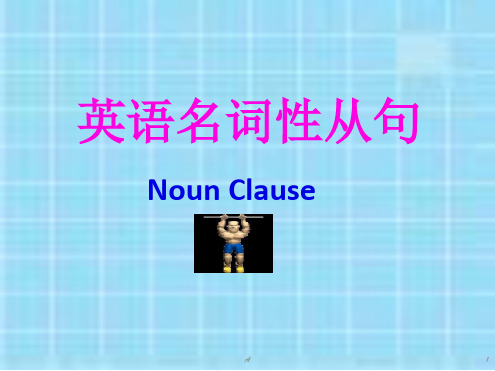
make our parents happy .
(表语从句)
“why ”----“为什__么__”、 _原_因__状_ 语、起 连接作用 “How”---- “ 如__何__”、方_式_状__语_ 、起连接 作用
A
24
Conclusion:
“when”-- “什么时候”、作状语、起连接作用
连接副词
tomorrow depends on the weather. 3. We're worried about ___w_h_e_th_e_rhe is safe.
4. I don't know ___w_h_e_t_h_e_r/_if_ he is well or not.
5. I don't know ____w_h_e_t_heor not he is well.
(同位语 )
1、主语从句 ( subject clause )
名词性 从句分 类
2、表语从句 ( predicative clause ) 3、宾语从句 ( object clause )
4、同位语从句 ( appositive clause )
A
3
辨别不同的从句
My dream is that I can enter a key university . 表语从句
a. 主语从句
b. 表语从句 c. 同位语从句 e. 介词后的宾语从句 f. whether to do 做动词宾语不能用 if to
do.
g whether or not 连在一起引导宾语从句时 不用if.
A
10
1. I asked her _i_f_/_w_h_e_t_h_e_r she had a bike. 2.W__h_e_t_h_erwe will hold a party in the open air
1 定语从句:修饰一个名词或代词的从句称为定语从句,一般

injured in the accident?
【结论5】指人时,定语从句中的关系代词只能用
who的情况:
①当先行词是anyone, those时,只用who。
②有两个定语从句皆指人时,其中一个关系代词
已用that,另一个宜用who。
【完成例句】 (16)那个门破了的教室在二楼。 The classroom whose door / the door of which / of which the door is broken is on the second floor. 【结论6】whose可以指代人或物,在定语从句 中作定语, 后跟名词。指物时,whose + 名 词= of which +名词 = 名词+ of which。
known to all. (4)每家有台电视,30年前我们认为是不可能的,现 在实现了。
To own a TV set in each family, which we think was impossible 30 years ago, now has become true.
例如:Harry Potter is the most interesting novel that I have read. (that I have read是定语从句;novel 是先行词;that 是关系代词,代替先行词novel, 在从句中作have read的宾语。)
个主句,相当于and this或and that。二者的区别主 要在于:
①as引导的非限制性定语从句既可以在主句前, 也可以在主句后,有时还可以在插入句中,常带有 “正如……,正像……”的意思。而which引导的非 限制性定语从句只能放在主句之后,翻译成“这”。
定语从句 名词性从句
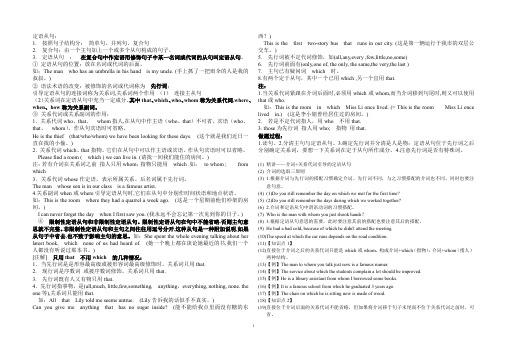
定语从句:1.按照句子结构分:简单句、并列句、复合句2.复合句:由一个主句加上一个或多个从句构成的句子。
3.定语从句:在复合句中作定语用修饰句子中某一名词或代词的从句叫定语从句。
①定语从句的位置:放在名词或代词的后面。
如:The man who has an umbrella in his hand is my uncle. (手上抓了一把雨伞的人是我的叔叔。
)②语法术语的改变:被修饰的名词或代词称为先行词;引导定语从句的连接词称为关系词,关系词两个作用(1)连接主从句(2)关系词在定语从句中充当一定成分。
其中that、which、who、whom称为关系代词,where、when、how称为关系副词。
③关系代词或关系副词的作用:1.关系代词who、that、whom指人,在从句中作主语(who、that)不可省。
宾语(who、that、whom),作从句宾语时可省略。
He is the thief(that/who/whom) we have been looking for these days.(这个就是我们近日一直在找的小偷。
)2.关系代词which、that指物。
它们在从句中可以作主语或宾语。
作从句宾语时可以省略。
Please find a room (which ) we can live in. (请找一间我们能住的房间。
)注:若有介词在关系词之前指人只用whom;指物只能用which .如:to whom ;from which3.关系代词whose作定语,表示所属关系。
后名词属于先行词。
The man whose son is in our class is a famous artist.4.关系副词when或where引导定语从句时,它们在从句中分别作时间状语和地点状语。
如:This is the room where they had a quarrel a week ago.(这是一个星期前他们吵架的房间。
英语语法从句类型总结

导语:英语学习有没有规律?学到何种程度才能算学好?英语学习需要哪些系统要素?⽆忧考整理了英语学习的⼀些资料,欢迎阅读。
⼀、定语从句 在复合句中,修饰名词或代词的从句叫定语从句,被修饰的名词或代词叫先⾏词,引导定语从句的有关系代词who,whom,whose,which,that等和关系副词where,when,why等,关系代词和关系副词在定语从句中担任句⼦成份。
1.由who引导的定语从句中,who⽤作主语,如:Thisistheboywhooftenhelpsme. 2.由whom引导的定语从句中,whom⽤作宾语,如:Themanwhomyouarewaitingforhasgonehome. 3.由whose引导的定语从句中,whose⽤作定语,如:Doyouknowthegirlwhoseskirtiswhite? 4.由which引导的定语从句中,which⽤作主语或谓语动词的宾语或介词的宾语,如: 5.由that引导的定语从句中,that可以指⼈或物,在从句中作主语或谓语动词的宾语,但不能放在介词后⾯作介词宾语,如: ThebookthatIboughtyesterdaywaswrittenbyLuXun. 6.由when,where,why引导的定语从句,如: Idon'tknowthereasonwhyhewaslate. Thisistheplacewherewehavelivedfor5years. I'llneverforgetthedaywhenImetMrLiforthefirsttime. 注意:先⾏词是表⽰地点时,如果从句的谓语动词是及物的,就⽤that(which),如果从句的谓语动词是不及物的,就⽤where引导。
ThisisthehouseWhich/thathehaslivedinfor15years.(Wherehehaslivedfor15year.) 7.限制性定语从句和⾮限制性定语从句 (1)限制性定语从句是句中不可缺少的组成部分,主句和从句之间不⽤逗号分开。
定语从句中需要注意的八个问题

定语从句中需要注意的八个问题1. 先行词是表示“人”的名词时引导词的选择先行词指具体的人时,引导词用who或whom引导;如果表示“人”的名词指的是一种“职业”时要用which引导。
Women who drink more than two cups of coffee a day have a greater chance of having heart disease than those who don’t. 每天喝两杯以上咖啡的妇女比那些不喝的妇女患心脏病的可能性更大。
Her sister has become a lawyer, which she wanted to be. 他的姐姐已经成为了一名律师,这正是他想成为的职业。
2. business, case, chair, point, scene, situation等名词后引导词的选择先行词是business, case, chair, point, scene, situation 等时,其后定语从句引导词的选择,和先行词是时间、地点的名词一样,取决于引导词在从句中所作的语法成分:作主语和宾语时用关系代词,作状语时用关系副词。
We’re just trying to reach a point where both sides will sit down together and talk. 我们正努力争取达到让双方坐下来商谈的结果。
(引导词作状语)---Do you have anything to say for yourselves?你自己有什么要说的吗?---Yes, there’s one point (that/which) we must insist on.是的,有一点我们必须要坚持(引导词作 insist on的宾语)If a shop has chairs where women can park their men, women will spend more time in the shop.如果商店里有女性让男性坐的椅子,女性将在这个店里花更多的时间。
专题 定语从句和名词性从句

专题一定语从句和名词性从句三,定名从解题两步法:1)判断从句成分是否完整,排除一部分选项。
2)定语从句看先行词做最终选择,名词性从句看题意做最终选择。
四,注意特殊问题。
1),定语从句中that的两用两不用原则:两用:1)先行词是最高级,序数词,不定代词或有人有物时;2)先行词被以上词或the only/the very/the last修饰时;两不用:1)在非限制性定语从句中不用that;2)关系词置于介词之后不用that;2),在定语从句中,当that/which/who/whom做从句宾语的时候,可省略。
在宾语从句中,that可省略。
其他情况下,只要是从句必须要有引导词。
3),定从中用“介词+which/whom”引导从句时,介词根据先行词和从句之间搭配来确定。
如:He is the boy with whom I played yesterday.(搭配:I played with the boy yesterday.) 4),定语从句中先行词是the way 且从句完整时,引导词有that/in which/省略。
5),定语从句中where/when/why可以用“介词+which/whom”代替。
如:this is the room where I lived=This is the room in which I lived.=This si the room that/which/省略I lived in.6),定语从句和同位语从句的区别:(1)定语从句可以修饰任何名词或代词,而同位语从句只能跟在抽象名词之后。
常用抽象名词有:fact, feeling, idea, news, hope, belief, thought, truth, doubt, suggestion, warning, reason, question, possibility,decision,promise等。
十个简单的定语从句

1The man who is wearing a hat is my neighbor.(戴帽子的男人是我的邻居。
)
2The movie that we watched last night was very exciting.(昨晚我们看的电影非常刺激。
)
3The school where I studied is very famous in the city.(我就读的学校在这个城市非常有名。
)
4The car that he drives is a red Ferrari.(他开的车是一辆红色的法拉利。
)
5The book which I borrowed from the library is very interesting.(我从图书馆借来的书非常有趣。
)
6The girl who is playing the piano is my sister.(弹钢琴的女孩是我的妹妹。
)
7The restaurant that we went to last night was very expensive.(昨晚我们去的那家餐厅非常贵。
)8The tree under which we had a picnic is very old.(我们野餐的那棵树非常古老。
)
9The computer that I bought last year is very fast.(我去年买的电脑非常快。
)
10The music that he is listening to is very relaxing.(他正在听的音乐非常放松。
)。
名词性从句、形容词性从句、副词性从句的语法知识点
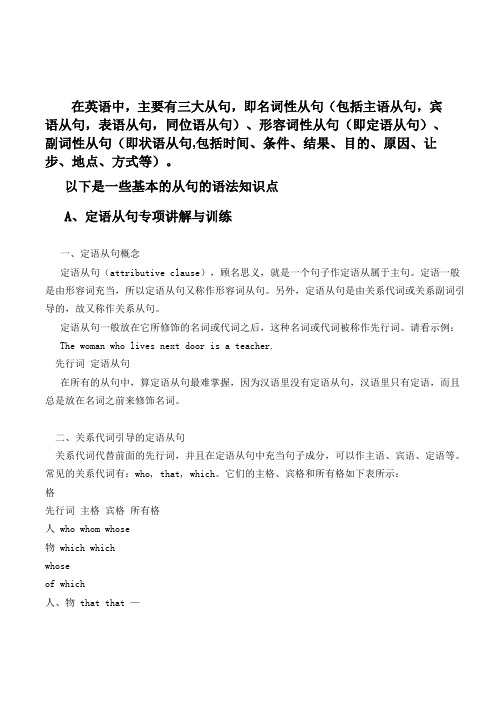
在英语中,主要有三大从句,即名词性从句(包括主语从句,宾语从句,表语从句,同位语从句)、形容词性从句(即定语从句)、副词性从句(即状语从句,包括时间、条件、结果、目的、原因、让步、地点、方式等)。
以下是一些基本的从句的语法知识点A、定语从句专项讲解与训练一、定语从句概念定语从句(attributive clause),顾名思义,就是一个句子作定语从属于主句。
定语一般是由形容词充当,所以定语从句又称作形容词从句。
另外,定语从句是由关系代词或关系副词引导的,故又称作关系从句。
定语从句一般放在它所修饰的名词或代词之后,这种名词或代词被称作先行词。
请看示例: The woman who lives next door is a teacher.先行词定语从句在所有的从句中,算定语从句最难掌握,因为汉语里没有定语从句,汉语里只有定语,而且总是放在名词之前来修饰名词。
二、关系代词引导的定语从句关系代词代替前面的先行词,并且在定语从句中充当句子成分,可以作主语、宾语、定语等。
常见的关系代词有:who, that, which。
它们的主格、宾格和所有格如下表所示:格先行词主格宾格所有格人 who whom whose物 which whichwhoseof which人、物 that that —(一)关系代词who, whom和 whose的用法who代替人,是主格,在定语从句中作主语。
例如:An architect is a person who designs buildings. 建筑师是设计房屋的人。
I will never forget the teacher who taught us chemistry in the first year of my senior middle school. 我将永远不会忘记在高一时教我们化学的那位老师。
Anyone who wants to apply for this job must send us the resume by email first. 想应聘这个职位的任何人都必须先通过电子邮件向我们发送简历。
定语从句 例句

定语从句例句定语从句不同于单词作定语的情况,它通常只能放在被修饰的词(即先行词)之后。
定语从句例句一1.你昨天错过的会议非常重要.The meeting that you have missed yesterday was very important.2.正在做演讲的女孩是我们班的班长.The girl who is making a speech right now is our monitor.3.我昨天打坏的花瓶是很昂贵的.The vase that I broke yesterday was very expensive.4.昨天帮助了你的男孩是我的邻居.The boy who helped you yesterday is my neighbour.5.这正是我所感兴趣的话题.That's just the topic that I'm very interested in.6.这是那个给我提供了宝贵机会的老板.He is just the boss who gave me that valueable opportunity.7.这个话题是我感到厌倦的.This is the topic/theme that I'm tired of.8.他是那个帮助了我的老师.He is the teacher who helped me.9.我们很喜欢那个很幽默的演讲者.We all like that speaker who is very humourous.10.两个女儿都是教师的那个老奶奶是我们的邻居.The old lady whose two daughters are both teachers is our neighbour定语从句例句二that代替关系副词 that可以用于表示时间、地点、方式、理由的名词后取代when, where, why和"介词+ which"引导的.定语从句,在口语中that常被省略,例如:His father died the year (that / when / on which) he was born. 他父亲在他出生那年逝世了。
名词性从句及定语从句
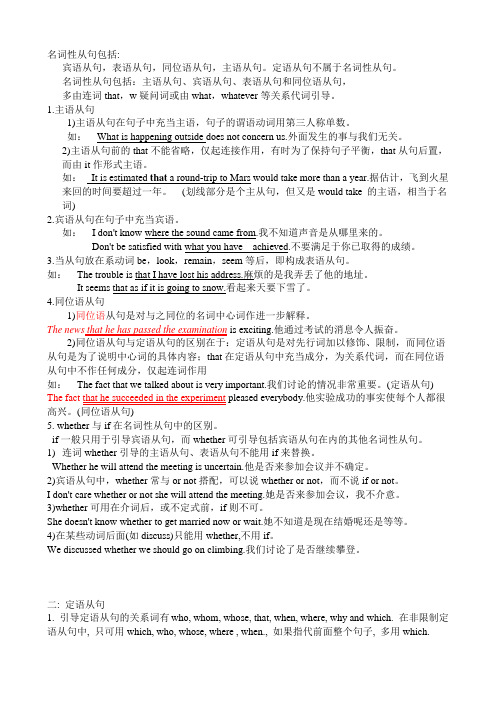
名词性从句包括:宾语从句,表语从句,同位语从句,主语从句。
定语从句不属于名词性从句。
名词性从句包括:主语从句、宾语从句、表语从句和同位语从句,多由连词that,w疑问词或由what,whatever等关系代词引导。
1.主语从句1)主语从句在句子中充当主语,句子的谓语动词用第三人称单数。
如:What is happening outside does not concern us.外面发生的事与我们无关。
2)主语从句前的that不能省略,仅起连接作用,有时为了保持句子平衡,that从句后置,而由it作形式主语。
如:It is estimated that a round-trip to Mars would take more than a year.据估计,飞到火星来回的时间要超过一年。
(划线部分是个主从句,但又是would take 的主语,相当于名词)2.宾语从句在句子中充当宾语。
如:I don't know where the sound came from.我不知道声音是从哪里来的。
Don't be satisfied with what you have achieved.不要满足于你已取得的成绩。
3.当从句放在系动词be,look,remain,seem等后,即构成表语从句。
如:The trouble is that I have lost his address.麻烦的是我弄丢了他的地址。
It seems that as if it is going to snow.看起来天要下雪了。
4.同位语从句1)同位语从句是对与之同位的名词中心词作进一步解释。
The news that he has passed the examination is exciting.他通过考试的消息令人振奋。
2)同位语从句与定语从句的区别在于:定语从句是对先行词加以修饰、限制,而同位语从句是为了说明中心词的具体内容;that在定语从句中充当成分,为关系代词,而在同位语从句中不作任何成分,仅起连词作用如:The fact that we talked about is very important.我们讨论的情况非常重要。
英语作文定语从句介绍名人定语从句的例子

英语作文定语从句介绍名人定语从句的例子全文共6篇示例,供读者参考篇1Hi everyone! Today I want to tell you about something called relative clauses with famous people. A relative clause is a clause that gives us more information about a noun in a sentence. It usually starts with words like who, which, or that.Let's look at some examples with famous people:1. Taylor Swift, who is a popular singer, won many awards.- The relative clause "who is a popular singer" gives us more information about Taylor Swift.2. Albert Einstein, who was a brilliant scientist, discovered the theory of relativity.- The relative clause "who was a brilliant scientist" tells us more about Albert Einstein.3. Beyonce, whose real name is Beyonce Knowles-Carter, is a talented performer.- The relative clause "whose real name is Beyonce Knowles-Carter" gives us more information about Beyonce.4. Cristiano Ronaldo, who plays for Juventus, is a famous soccer player.- The relative clause "who plays for Juventus" tells us more about Cristiano Ronaldo.So, remember that relative clauses can help us add more details about famous people or any noun in a sentence. Keep practicing and you'll get the hang of using them correctly!篇2OK! Here we go:Hey guys, today I want to talk about something super cool - relative clauses with famous people!So, what is a relative clause? It's a part of a sentence that gives us more information about a noun. And when we use a relative clause to talk about a famous person, it's like adding an extra detail to make our sentence more interesting.For example, let's talk about Taylor Swift. She is a famous singer. Now, if we want to use a relative clause to give more information about Taylor Swift, we can say, "Taylor Swift, who isknown for her catchy pop songs, has won many awards." So, in this sentence, "who is known for her catchy pop songs" is the relative clause because it tells us more about Taylor Swift.Another example is Cristiano Ronaldo. He is a talented soccer player. If we want to add more details about him, we can say, "Cristiano Ronaldo, who plays for Juventus, has scored many goals in his career." In this sentence, "who plays for Juventus" is the relative clause that describes Cristiano Ronaldo.So, using relative clauses with famous people is a fun way to make our sentences more interesting and informative. Try it out with your favorite celebrities and see how you can add more details to your writing. Happy writing, everyone!篇3Hi everyone! Today I want to talk to you about famous people and how we use defining relative clauses to describe them. Defining relative clauses are words that give more information about a noun. Let's look at some examples with famous people:1. Taylor Swift, who is a talented singer-songwriter, has won many awards in the music industry.- In this sentence, "who is a talented singer-songwriter" is a defining relative clause that gives extra information about Taylor Swift.2. Cristiano Ronaldo, who plays for Juventus FC, is considered one of the greatest footballers of all time.- Here, "who plays for Juventus FC" describes which team Cristiano Ronaldo is a part of.3. Emma Watson, who starred in the Harry Potter movies, is also a passionate advocate for gender equality.- "Who starred in the Harry Potter movies" explains Emma Watson's role in the entertainment industry.These are just a few examples of how we can use defining relative clauses to add details about famous people. The next time you talk about a celebrity, try using a defining relative clause to give more information about them. Thanks for listening!篇4Once upon a time, there was a famous singer named Taylor Swift. She is the one who sings beautiful songs like "Love Story"and "Shake It Off". Do you know that Taylor Swift, who won many Grammy Awards, used to be a country singer?Another famous person is Cristiano Ronaldo, who is a talented soccer player. He plays for Juventus and he is the one whose goal celebrations are always so cool. Did you know that Cristiano Ronaldo, who is from Portugal, used to play for Manchester United?There is also Emma Watson, who is known for playing Hermione Granger in the Harry Potter movies. She is the one who is a strong advocate for gender equality. Did you know that Emma Watson, whose speeches are always inspiring, graduated from Brown University?These are just some examples of famous people who have achieved great success in their careers. We can use relative clauses to give more information about these people and make our sentences more interesting. So next time when you talk about your favorite celebrities, don't forget to use relative clauses to add more details!篇5Sure! Here is a funny and cute English essay about defining relative clauses with examples of famous people:Do you know what a defining relative clause is? It's like when you use a sentence to tell more about a person or thing. Let me show you some examples with famous people!First, let's talk about Cristiano Ronaldo, who is a famous soccer player. He is the one who always scores amazing goals in every game. Do you know Ronaldo, who has won five Ballon d'Or awards? That's the defining relative clause telling us more about him.Next, let's talk about Taylor Swift, who is a famous singer. She is the one who writes her own songs and sings beautifully. Have you heard Taylor Swift, who has won many Grammy awards? That's another defining relative clause for you!And how about Albert Einstein, who is a famous scientist? He is the one who came up with the theory of relativity. Have you read about Albert Einstein, who won the Nobel Prize in Physics? That's another defining relative clause about him.So, defining relative clauses are like adding extra information about a person or thing in a sentence. They help us understand more about them and make our sentences more interesting. Try using defining relative clauses when you talk about your favorite celebrities and see how fun it can be!篇6Hey guys! Today I’m gonna tell you about something super cool - famous people and something called "relative clauses" in English.So, first of all, what are relative clauses? They are a fancy way to add extra information to a sentence. It’s like, if you want to talk about a famous person, you can add more details to describe them using a relative clause.For example, let’s ta lk about Taylor Swift. She is a famous singer. We can add a relative clause to give more information about her, like this: Taylor Swift, who is known for her hit songs and catchy melodies, has won many music awards.See how we added the part “who is kn own for her hit songs and catchy melodies”? That’s the relative clause and it helps us know more about Taylor Swift.Another example is about Cristiano Ronaldo. He is a famous soccer player. We can use a relative clause to give more details about him, like this: Cristiano Ronaldo, who plays for Juventus in Italy, is considered one of the best soccer players in the world.In this sentence, the relative clause “who plays for Juventus in Italy” tells us more about Cristiano Ronaldo and where he plays soccer.So, you see, using relative clauses can make our sentences more interesting and informative when we talk about famous people. Try adding them when you write or speak in English! It’s super fun!。
定语从句句知识点总结

定语从句句知识点总结基本结构定语从句由关系代词和关系副词引导,其基本结构如下:关系代词:who, whom, whose, which, that关系副词:when, where, why关系代词的用法1. 关系代词作宾语The man who(m) I met yesterday is a doctor.昨天我遇到的那个人是一名医生。
这里的定语从句“whom I met yesterday”修饰先行词“the man”,在句中作宾语。
2. 关系代词作主语The book that I borrowed from the library is very interesting.我从图书馆借来的那本书很有趣。
定语从句“that I borrowed from the library”修饰先行词“the book”,在句中作主语。
3. 关系代词作表语The reason why he was late is that his car broke down.他迟到的原因是他的车坏了。
定语从句“why he was late”修饰先行词“the reason”,在句中作表语。
4. 关系代词作定语The girl whose mother is a teacher is my best friend.那个母亲是老师的女孩是我最好的朋友。
定语从句“whose mother is a teacher”修饰先行词“the girl”。
关系副词的用法1. 关系副词引导地点状语从句This is the hotel where we stayed last year.这就是我们去年住过的旅馆。
定语从句“where we stayed last year”修饰先行词“the hotel”。
2. 关系副词引导时间状语从句He remembered the day when he first met her.他记得他第一次见到她的那天。
定语从句中文句子

定语从句中文句子以下是 9 条带有定语从句的中文句子及例子:1. 那个总是带着微笑的女孩,就是我心中的小太阳。
- 你看,我们班的那个总是带着微笑的女孩,今天又主动帮同学解答问题呢,她不就是像小太阳一样温暖大家吗?2. 我喜欢这部有深刻内涵的电影,它真的让我感触良多。
- 哎呀,昨晚我看了那部有深刻内涵的电影,看到最后我都感动哭了,你说它是不是特别能打动人心啊!3. 这就是那个曾经帮助过我的朋友,我一直都很感激他。
- 还记得那次我遇到困难,手足无措的时候,就是那个曾经帮助过我的朋友及时出现帮了我,我怎么能不感激他呢!4. 那个我小时候经常去的公园,现在变化好大呀。
- 小时候那个我经常去的公园,有好多好玩的游乐设施呢,现在再去,哇,变化好大呀,简直认不出来了呢!5. 他找到的那本有珍贵签名的书,可把他高兴坏了。
- 你知道吗,他找了好久,终于找到了那本有珍贵签名的书,哇,那可把他高兴坏了,像中了大奖一样!6. 这位是我非常敬佩的有着丰富经验的老师。
- 瞧瞧,这位就是我非常敬佩的有着丰富经验的老师,他上课可太有趣了,我们都超喜欢他!7. 我买了那件她一直想要的有着漂亮图案的裙子。
- 她生日的时候,我特意去买了那件她一直想要的有着漂亮图案的裙子送给她,她高兴得不得了!8. 那家有着独特风格的餐厅,总是吸引很多人去。
- 哇,那家有着独特风格的餐厅,每次路过都看到好多人在里面呢,真有那么好吃吗?9. 那个拥有善良心灵的男孩,是我想共度一生的人。
- 他呀,就是那个拥有善良心灵的男孩,我觉得他就是我想共度一生的人,难道不是吗?我的观点结论:这些句子通过定语从句的运用,更加准确、生动地描述了人或事物,让人能更直观地感受到所表达的情感和内容。
定语从句的种类

定语从句的种类定语从句的种类引导语:从句是相对于主句而言的,即它是从属于某一个主句,而不能单独作一个句子.在中,主要有三大从句,即名词性从句(包括主语从句,宾语从句,表语从句,同位语从句)、形容词性从句(即定语从句)、副词性从句(即状语从句,包括时间、条件、结果、目的、原因、让步、地点、方式等).主语从句用作主语,如:That the earth is round is true.地球为圆的是真实的.宾语从句用作宾语.如:Do you know where he lives?表语从句用作表语,如:My opinion is that you should not go alone.我的意见是你不应单独前往.同位语从句用于解释说明前面的名词.如:The fact that the earth is round is true.地球是圆的的事实是真实的.(that从句用于解释说明the fact)定语从句相当于一个形容词,用于修饰前面的名词.如:The student who answered the question was John.回答问题的学生是John.状语从句相当于一个副词,如:When it rains,I usually go to school by bus.天下时,我通常坐公共汽车上学.(时间状语)If he comes tomorrow,you will see him.如果他明天来,你就可以看见他.(if 引导的条件状语从句,其结构为:if +状语从句,+主句).要注意在状语从句中有一个规则是“主将从现”,即主句是将来时,则从句要用一般现在时表示将来.主句和从句的划分方法是相同的.句子的成分从谓语动词处来划分比较容易.谓语动词前面的部分是主语,后面常接宾语,修饰谓语动词的是状语,修饰主语、宾语的是定语,若谓语是系动词,则系动词后的部分是表语.如:I am a teacher.其中,I 是主语,am是谓语,a teacher 是表语.He likes playing football very mucy.其中,he是主语,likes是谓语,playing football是宾语,very much是状语.英语中8种从句介绍1定语从句2时间状语从句3地点状语从句4条件状语从句5同位语从句6表语从句7宾语从句8主语从句名词性从句:在句子中起名词作用的句子叫名词从句(Noun Clauses).名词从句的功能相当于名词词组,它在复合句中能担任主语、宾语、表语、同位语、介词宾语等,因此根据它在句中不同的语能,名词从句又可分别称为主语从句、宾语从句、表语从句和同位语从句.引导名词性从句的`连接词引导名词性从句的连接词可分为三类:连接词:that,whether,if 不充当从句的任何成分)连接代词:what,whatever,who,whoever,whom,whose,which.连接副词:when,where,how,why不可省略的连词:1.介词后的连词2.引导主语从句和同位语从句的连词不可省略.That she was chosen made us very happy.We heard the news that our team had won.比较:whether与if 均为"是否"的意思.但在下列情况下,whether不能被if 取代:1.whether引导主语从句并在句首2.引导表语从句3.whether从句作介词宾语4.从句后有"or not"Whether he will come is not clear.大部分连接词引导的主语从句都可以置于句末,用 it充当形式主语.It is not important who will go.It is still unknown which team will win the match.由从属连词that引导的从句叫做名词性that-从句.That只起连接主句和从句的作用,在从句中不担任任何成分,本身也没有词义.名词性that-从句在句中能充当主语、宾语、表语、同位语和形容词宾语,例如:主语:That he is still alive is sheer luck.他还活着全靠运气.宾语:John said that he was leaving for London on Wednesday.约翰说他星期三要到伦敦去.表语:The fact is that he has not been seen recently.事实是近来谁也没有见过他.同位语:The fact that he has not been seen recently disturbs everyone in his office.近来谁也没有见过他,这一事实令办公室所有的人不安.形容词宾语:I am glad that you are satisfied with your job.你对工作满意我感到很高兴.2)That- 从句作主语通常用it作先行词,而将that-从句置于句末,例如:It is quite clear that the whole project is doomed to failure.很清楚,整个计划注定要失败.It's a pity that you should have to leave.你非走不可真是件憾事【定语从句的种类】。
中文定语从句

中文定语从句中文定语从句要先搞清楚定语从句,首先得知道形容词,而形容词和名词的概念对于我们母语为中文的人而言,可以占点小便宜,因为性质基本上跟我们中文中的理解差不多。
形容词几乎都是用来修饰名词的,既然形容词的服务对象是名词,那么我们必须要先看看名词,不是好多鸡汤文章里面说,要了解一个人,最好看他的朋友圈嘛。
如下是店铺给大家整理的中文定语从句,希望对大家有所作用。
中名词的概念跟中文中名词的概念基本一致,我们看看名词的英语解释:A word that is used to name a person, place, thing, quality, or action and can function as the subject or object of a verb, the object of a preposition, or an appositive.名词:表示名称,如人、地、事、性质或行为的词,可作为主语或动词的宾语,介词的宾语或同位语。
(美国传统词典)那么可以看出名词的.这个概念基本跟我们中文中名词概念是一样滴,所以说名词这个东西我们已经提前了20多年了,不用再啰嗦了。
那么搞定了名词还不行,我们在中会面临很多交流上面的问题,那就是:“怎么明确而清晰的表示这是一个样的名词“,而不至于让别人产生模糊或者误解的想法。
打个比方我们设定一个这样的场景:你和你闺蜜在一个饭馆里面吃饭,你们俩都看见了一个牵着一条小狗的帅哥,并对其评头品足了一番,然后你和你闺蜜吃完饭就各自回去了。
然后你在回家的路上居然发现这个帅哥在一家酒吧外面跟某个女明星约会,场景如下。
第二天闲聊的时候你把这个情况说给你闺蜜听(或者当场就打电话告诉她)。
你开始就讲:一个帅哥亲了一个女孩A handsome man kissed a woman.闺蜜肯定会不以为然,也没有什么兴趣,男的和女的亲嘴,那有什么大惊小怪的,你脑子没有问题吧。
然后你就说:The handsome man kissed the woman.这下你闺蜜可能会来兴趣了,居然用the了,那就是特指了,那肯定是我认识,或者我可能会比较感兴趣的人。
定语从句名词性从句强调
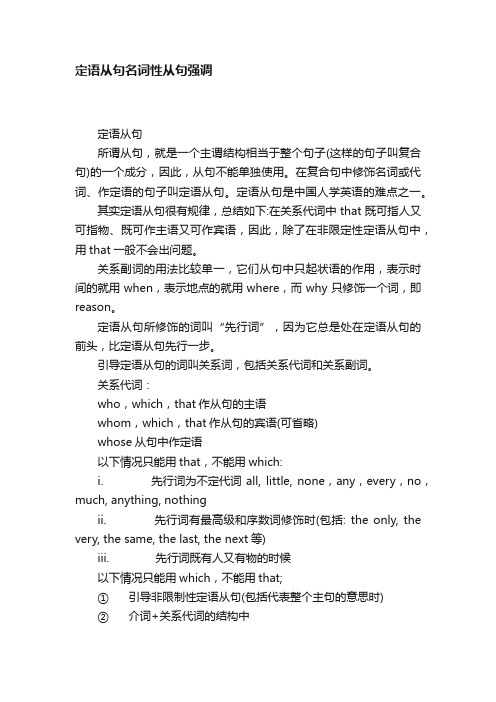
定语从句名词性从句强调定语从句所谓从句,就是一个主谓结构相当于整个句子(这样的句子叫复合句)的一个成分,因此,从句不能单独使用。
在复合句中修饰名词或代词、作定语的句子叫定语从句。
定语从句是中国人学英语的难点之一。
其实定语从句很有规律,总结如下:在关系代词中that既可指人又可指物、既可作主语又可作宾语,因此,除了在非限定性定语从句中,用that一般不会出问题。
关系副词的用法比较单一,它们从句中只起状语的作用,表示时间的就用when,表示地点的就用where,而why只修饰一个词,即reason。
定语从句所修饰的词叫“先行词”,因为它总是处在定语从句的前头,比定语从句先行一步。
引导定语从句的词叫关系词,包括关系代词和关系副词。
关系代词:who,which,that作从句的主语whom,which,that作从句的宾语(可省略)whose从句中作定语以下情况只能用that,不能用which:i. 先行词为不定代词all, little, none,any,every,no,much, anything, nothingii. 先行词有最高级和序数词修饰时(包括: the only, the very, the same, the last, the next等)iii. 先行词既有人又有物的时候以下情况只能用which,不能用that;①引导非限制性定语从句(包括代表整个主句的意思时)②介词+关系代词的结构中关系副词:when指时间,在定语从句中作时间状语where指地点,在定语从句中作地点状语why指原因,在定语从句中作原因状语,只修饰reason。
如果用定语从句把两个句子合二为一:首先找出两个句子当中相同的部分,定语从句修饰的就是这一部分。
要把其中一个句子变成定语从句,就要把这句中相同的那个部分用一个关系词来代替;代替时,先看被代替的部分是指人还是指物、再看它作什么句成分。
指人并作主语的,就用who。
从句的分类
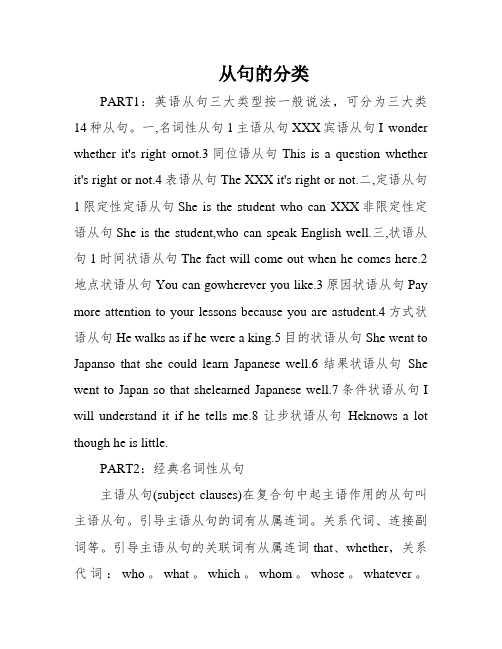
从句的分类PART1:英语从句三大类型按一般说法,可分为三大类14种从句。
一,名词性从句1主语从句XXX宾语从句I wonder whether it's right ornot.3同位语从句This is a question whether it's right or not.4表语从句The XXX it's right or not.二,定语从句1限定性定语从句She is the student who can XXX非限定性定语从句She is the student,who can speak English well.三,状语从句1时间状语从句The fact will come out when he comes here.2地点状语从句You can gowherever you like.3原因状语从句Pay more attention to your lessons because you are astudent.4方式状语从句He walks as if he were a king.5目的状语从句She went to Japanso that she could learn Japanese well.6结果状语从句She went to Japan so that shelearned Japanese well.7条件状语从句I will understand it if he tells me.8让步状语从句Heknows a lot though he is little.PART2:经典名词性从句主语从句(subject clauses)在复合句中起主语作用的从句叫主语从句。
引导主语从句的词有从属连词。
关系代词、连接副词等。
引导主语从句的关联词有从属连词that、whether,关系代词:who。
what。
which。
whom。
- 1、下载文档前请自行甄别文档内容的完整性,平台不提供额外的编辑、内容补充、找答案等附加服务。
- 2、"仅部分预览"的文档,不可在线预览部分如存在完整性等问题,可反馈申请退款(可完整预览的文档不适用该条件!)。
- 3、如文档侵犯您的权益,请联系客服反馈,我们会尽快为您处理(人工客服工作时间:9:00-18:30)。
定语从句一、结构:先行词+引导词+定语从句。
引导词:引导词就是引导从句的词,比如whether,how,what ,why,when等具有引导其后从句功能的词。
二、种类:限定性定语从句和非限定性定语从句两种。
对先行词分别起必要的描述或说明和对先行词进行补充说明、解释的作用。
非限定性定从中,先行词与定从有“,”隔开。
I met John, who told me the news.He told me a story yesterday, which I think is very interesting.Helen was much kinder to her youngest son than to the others, which , of course, made the others envy him.He has two sons, who work in the same company. (He has only two sons.)He has two sons who work in the same company. (Perhaps he has more than two sons)三、引导词的作用1.She is the girl __who___ lives next door.2.This is the girl ____________ I teach.3.Have you seen the book _______ I borrowed yesterday?4.The hall ________ was built 30 years ago still attracts a lot of tourists.5.This is the scientist _________ achievements are well known.6.This is the house ________ windows broke last night.7.He was late for the opening ceremony, ______ was very surprising to me.8.Luxun, _______ real name was Zhou Shuren, wrote many political novels and essays.9.We went through a period ________ communications were very difficult in the rural areas.10.They will fly to Washington, ______ they plan to stay for two or three days.11.We have found such materials _______are used in their factory.12.He is not the same man _______ he was.13.______ is known to everybody, the moon travels round the earth once every month.14.She has been absent again, ______ is expected.四、疑难点1.当先行词是不定代词、形容词最高级、序数词、the only, the very, any, few, little, no, all等,只用that,不用which:Do you have anything _______ you want to say for yourself?This is the very person _______ I am waiting for.This is the best _____ has been used against pollution.What is the first American film _____ you have seen?2.在非限定从中,或动词短语的介词提前时,只用which, 不用that:The road conditions there turned out to be very good, ___ was more than we could expect.This is the house in _______ Luxun once lived.3.地点模糊化: stage, case, situation, pointThe accident has reached to a point _____ both their parents are to be called in.Later in this chapter cases will be introduced to readers _____ consumer complaints have resulted in changes in the law.4.高考再现1.Look out! Don’t get too close to the house _____ roof is under repair.A. whoseB. whichC. of whichD. that2.New Y ork, ____ last year, is a nice old city.A. that I visitedB. which I visitedC. where I visitedD. in which I visited3.His movie won several awards at the film festival, ____ was beyond his wildest dream.A. whichB. thatC. whereD. it4.Some pre-school children go to a day care center, ____ they learn simple games and song.A. thenB. thereC. whileD. where5.We shouldn’t spend our money testing so many people, most of ___ are healthy.A. thatB. whichC. whatD. whom6.Those successful deaf dancers think that dancing is an activity ____ sight matters morethan hearing.A. whenB. whoseC. whichD. where7.Women ___ drink more than two cups of coffee a day have a greater chance of havingheart disease than those ___ don’t.A. who; /B. / ; whoC. who; whoD. / ; /8._____ I explained on the phone, your request will be considered at the next meeting.A. WhenB. AfterC. AsD. Since9.I walked in our garden, ____ Tom and Jim were trying a big sign onto one of the trees.A. whichB. whenC. whereD. that10.The owner of the cinema needed to make a lot of improvements and employ more peopleto keep it running, ___ meant spending tens of thousands of pounds.A. whoB. thatC. asD. which11.A fast food restaurant is the place_, just as the name suggests, eating is performed quickly.A. whichB. whereC. thereD. what12.____ is reported in the newspapers, talks between the two countries are making progress.A. ItB. AsC. ThatD. What13.Do you still remember the chicken farm ___ we visited three months ago?A. whereB. whenC. thatD. whatst month, part of Southeast Asia was struck by floods, from ___ effects the people arestill suffering.A. thatB. whoseC. thoseD. what15.If a shop has chairs _ women can park their men, women will spend more time in the shop.A. thatB. whichC. whenD. where16.Chan’s restaurant on Baker Street, ___ used to be poorly run, is now a successful business.A. whatB. whichC. whoD. where17.The village has developed a lot ____ we learned farming two years ago.A. whenB. whichC. thatD. where18.Y ou can only be sure of what you have at present; you can’t be sure of something __ youmight get in the future.A. whatB. whichC. thatD. when19.After graduation she reached a point in her career ___ she needed to decide what to do.A. thatB. whatC. whichD. where20.We’ll discuss a number of cases___ beginners of English fail to use the language properly.A. whichB. asC. whyD. where5.介词+引导词1.We went through a period _________ communications were very difficult in the rural areas.A . which B. whose C. in which D. with which2. By nine o’clock, all the Olympic torch bearers had reached the top of Mount Qomolangma, _______ appeared a rare rainbow soon.A. of whichB. on whichC. from whichD. above which3. For many cities in the world, there is no room to spread out further, _ New Y ork is an example.A. for whichB. in whichC. of whichD. from which4. The schools themselves admit that not all children will be successful in the jobs ___ they are being trained.A. in thatB. for thatC. in whichD. for which5. He was educated at a local grammar school, _______ he went on to Cambridge.A. from whichB. after thatC. after whichD. from this6. He was educated at the local high school, _______ he went on to Beijing University.A. after whichB. after thatC. in whichD. in that7. Eric received training in computer for one year, ______ he found a job in a big company.A. after thatB. after whichC. after itD. after this8. I saw a woman running toward me in the dark. Before I could recognize who she was, she had run back in the direction _____ she had come.A. of whichB. by whichC. in whichD. from which9. We saw several natives advancing towards our party, and one of them came up to us, ___ we gave some bells and glasses.A. to whichB. to whomC. with whomD. with which10. Human facial expressions differ from those of animals in the degree ____ they can be controlled on purpose.A. with whichB. to whichC. of whichD. for which11. The book was written in 1946, ______ the education system has witnessed great changes.A. whenB. during whenC. since thenD. since when12. It is reported that two schools, _______ are being built in my hometown, will open next year.A. they bothB. which bothC. both of themD. both of which13. The growing speed of a plant is influenced by a number of factors, ___ are beyond our control.A. most of themB. most of whichC. most of whatD. most of that14. The man pulled out a gold watch, _______ were made of small diamonds.A.the hands of whomB. whom the hands ofC. which the hands ofD. the hands of which 名词性从句一、种类:_____________ _______________ __________________ ________________二、引导词1.It’s certain that she will do well in her exam.2.That we are invited to a concert this evening is good news to us.3.Whether the meeting will be given is still a problem.4.It makes no difference where we shall have the meeting.5.It has not been decided yet who will preside (主持) over the meeting.6.What they need is a good textbook.7.Whichever book he bought would be paid for.8.Whoever did this job must be rewarded.9.Do you know that he has joined the army?10.I am sure that he will pass the exam.11.We think it highly probable that he is dead.12.We consider it necessary that he should improve his pronunciation.13.He has made it clear that he will not give in.14.He is a good student except that he is a little bit careless.15.I don’t care if he doesn’t come.16.It depends on whether you can do the work well.17.I can’t imagine how he did it.18.They couldn’t understand why I refused it.19.It all depends on how we solve the problem.20.We are worrying about what we should do next.21.We shall not forget when the meeting will open.22.She will give whoever needs help a warm support. (可用no matter who替换吗?)23.She walked up to where he stood.24.I can judge by what I know of him.25.Y ou can write about whatever topic you prefer.26.We’ll make him whatever he is fit for.27.I’ll call the baby whatever name you like.28.He has made the company what it is today.29.My decision is that all of us are to start at 6 o’clock tomorrow morning.30.The problem is where we should stay.31.This is where our problem lies.32.Tomorrow is when it would be most convenient.33.There is a feeling in me that we’ll never know what a UFO is ---not ever.34.My question how I shall get in touch with him has not been answered.35.I gave the girl a big doll, exactly what she longed to have.三、that, which, what的用法:1充当成分?2有含义?3 后接名词?。
